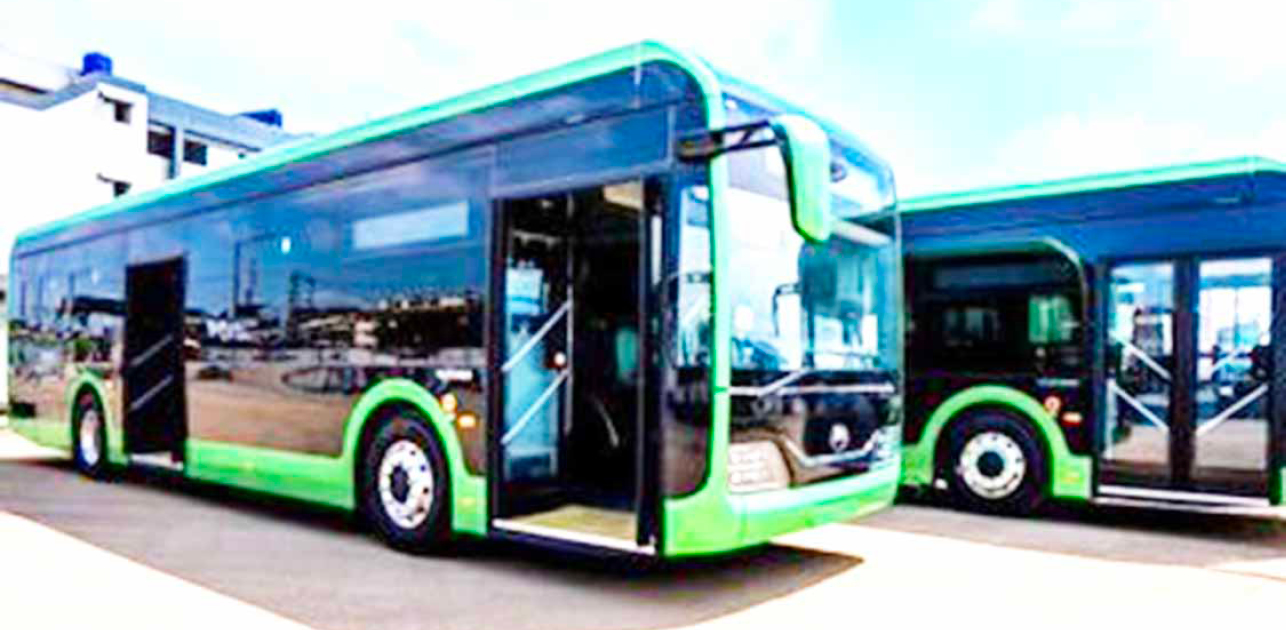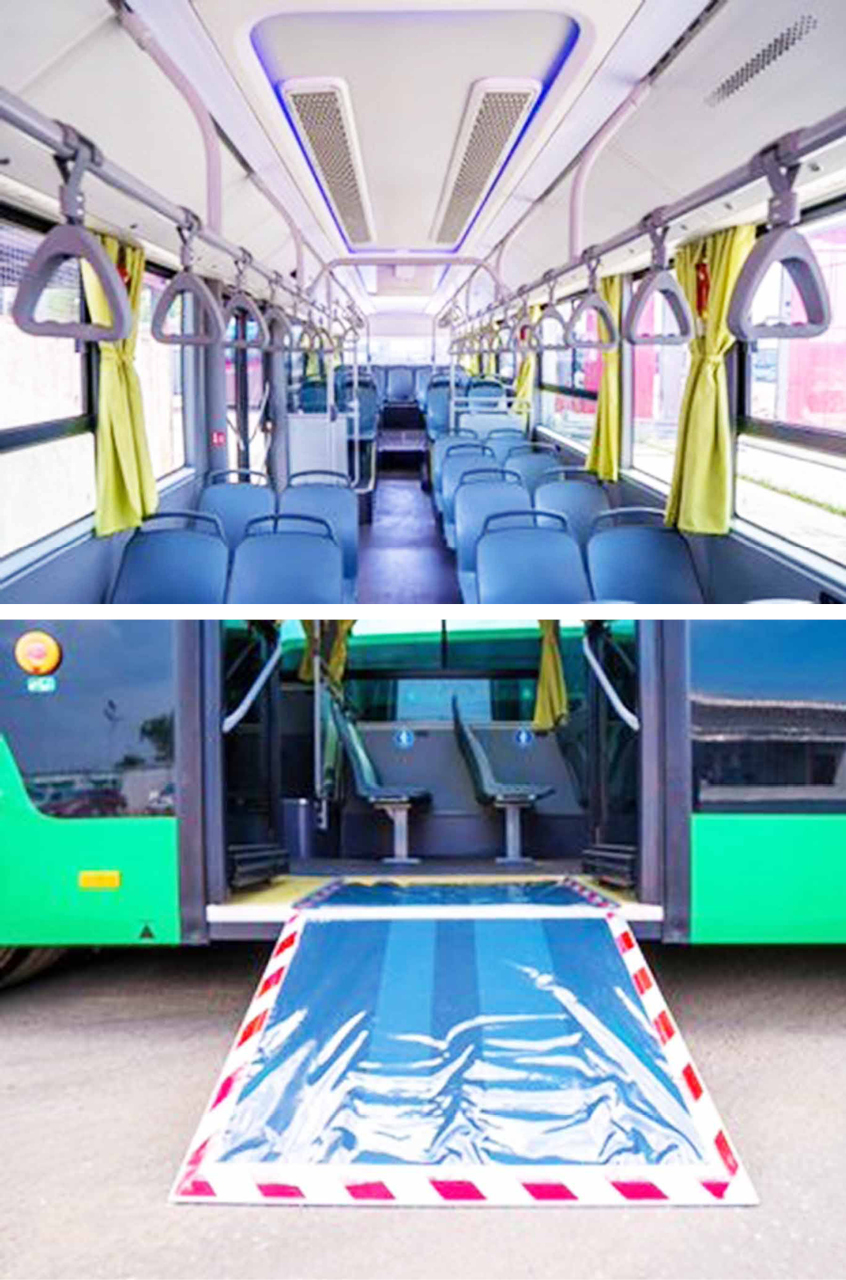Electric buses: Decarbonising Lagos’ transport system
Lagos State, like most cities in the world, is faced with urban transport challenges which include traffic congestion, parking problems, accidents and environmental pollution. While the state is addressing some of these challenges with its multi-modal mass-transport scheme and improved infrastructure, it recently acquired electric buses towards the attainment of a sustainable road transport system. […]

FILE PHOTO: Buses
Lagos State, like most cities in the world, is faced with urban transport challenges which include traffic congestion, parking problems, accidents and environmental pollution.
While the state is addressing some of these challenges with its multi-modal mass-transport scheme and improved infrastructure, it recently acquired electric buses towards the attainment of a sustainable road transport system.
The governor, Babajide Sanwo-Olu, who announced the arrival of the first set of electric buses on April 30, said it is part of efforts to modernise every sector of Lagos.
“Our new electric buses will not only reduce carbon emissions but will also increase efficiency. This means that Lagosians can say goodbye to high fuel costs and hello to cost-efficient transportation. We shall be running a pilot scheme over the next few months to gather sufficient data required to analyse the operational efficiencies relative to the current BRT buses to further improve our public transport service,” he said.
- FG hails Gavi’s return to direct programme funding in Nigeria
- How to Create an Abundant Fruit Garden That Provides Year-Round Harvests

Air pollution major threat to sustainable growth
A study by the World Bank estimates that illness and premature deaths due to ambient air pollution caused losses of $2.1 billion in 2018, representing 2.1 percent of Lagos State’s GDP.
The study also discovered that ambient air pollution led to about 11,200 premature deaths, the highest in West Africa. Children under five were the most affected, accounting for 60 percent of total deaths while adults suffered from heart disease, lung cancer, and chronic obstructive pulmonary disease.
An estimated 30 percent of Lagos’ PM2.5 (Fine particulate matter) air pollution concentrations are attributable to road transport. The World Bank in its study noted that 227 vehicles clog each kilometre of road daily in the financial hub of Nigeria. Most vehicles are over 15 years old, using old emission technologies and fuel with high sulfur levels: 200 times higher than U.S. standards for diesel.
According to the Center for Research on Energy and Clean Air (CREA), the projected economic impact of absenteeism and premature mortality as a result of air pollution in Lagos is expected to increase by 60 percent from $1bn to $7.2bn between 2019 and 2040 under a business-as-usual scenario. However, the state could raise more than $1.7bn in 2040 alone if it implements a series of measures to reduce air pollution.
Hence, experts and stakeholders have commended the partnership between the Oando Clean Energy Limited (OCEL) and Lagos Metropolitan Area Transport Authority (LAMATA) to deploy Electric Vehicle (EV) infrastructure ecosystem that would include electric buses, charging stations and other supporting infrastructure towards the attainment of a sustainable road transport system in Lagos State.
While noting that the collaboration is a testament to the commitment to create a sustainable future for Lagos, Sanwo-Olu reiterated his government’s efforts to increase the fleet of electric vehicles in transforming the state to a smart city.
On its part, OECL said the company’s strategic vision is to decarbonize the transport system in the country by rolling out over 12,000 buses in the next seven years that will help in transition from the current combustion mass transit buses to electric.
“In the medium to long term, and in line with our ambitions, our efforts within sustainable transport will lead to improved air quality, enhanced public health, enable the employment of at least 3,000 new drivers and an additional 2,000 workers to support bus maintenance, depot management, as well as estimated economic cost savings of US$2.6bn (3.6 percent of Lagos’s GDP),” it said.
The company said it partnered with Yutong Bus Co Limited, the world’s largest electric vehicle manufacturer to produce the electric buses, equipped with air conditioning and Wi-Fi. In addition to the arrival of these electric buses, OCEL said it also took delivery of the charging stations and spare parts necessary to ensure their effective operation, stressing that it marks the commencement of its Sustainable Transport Initiative, which is one of the Company’s pipeline projects to support Nigeria in meeting her goal of net zero by 2060.
The chairman of OCEL, Adewale Tinubu, added: “audacity and innovation have always been key tenets in our journey to transform Nigeria’s energy future. It’s this spirit that has brought us to this juncture today – at the forefront of propelling Nigeria towards realizing her net-zero targets. The arrival of our electric mass transit buses and development of an EV infrastructure ecosystem is a reminder that the only way to remain ahead of the curve is by being unafraid to break new ground and consistently looking for opportunities to leapfrog.”
Daily Trust Saturday gathered that the partnership with Yutong included in the long term, the construction of a local Electric Vehicle assembly plant to boost indigenous capacity as well as in the short term, the provision of Universal Chargers at public places like malls and gas stations.
The state government has also allayed fear of the bus stopping in transit, noting that at full charge, the bus can travel for 280 kilometres while the average daily usage by existing bus rapid transit (BRT) is 200km.
It is believed that during the pilot period, the state and its partners would be able to address other challenges ahead of the roll-out later in the year.
